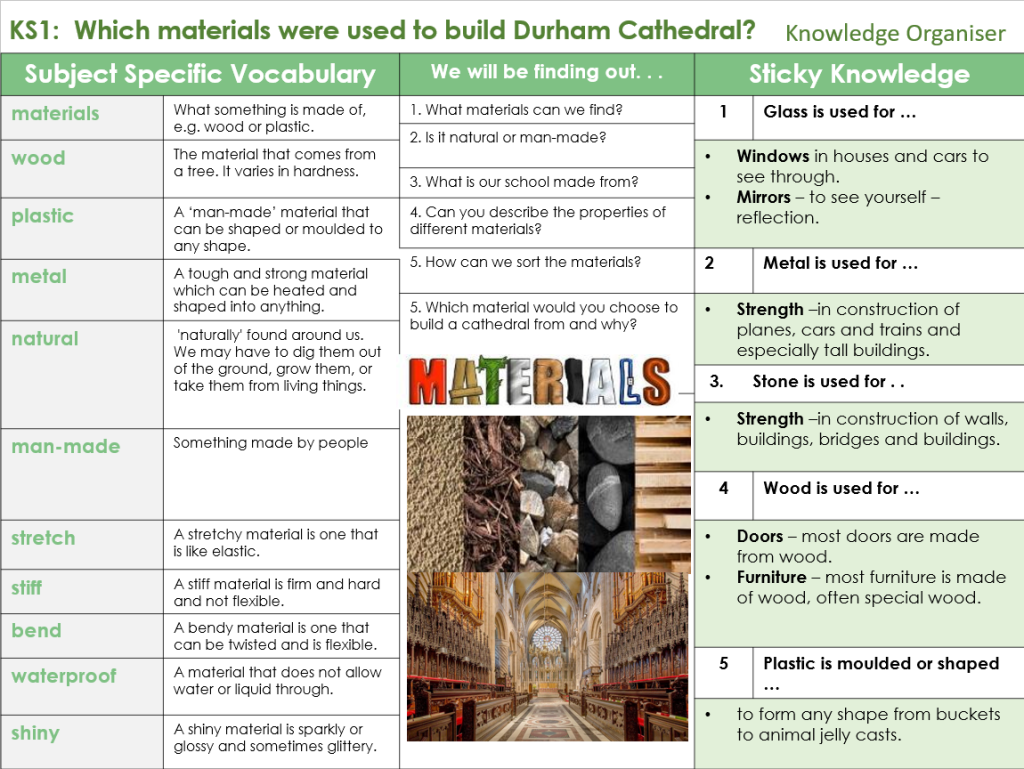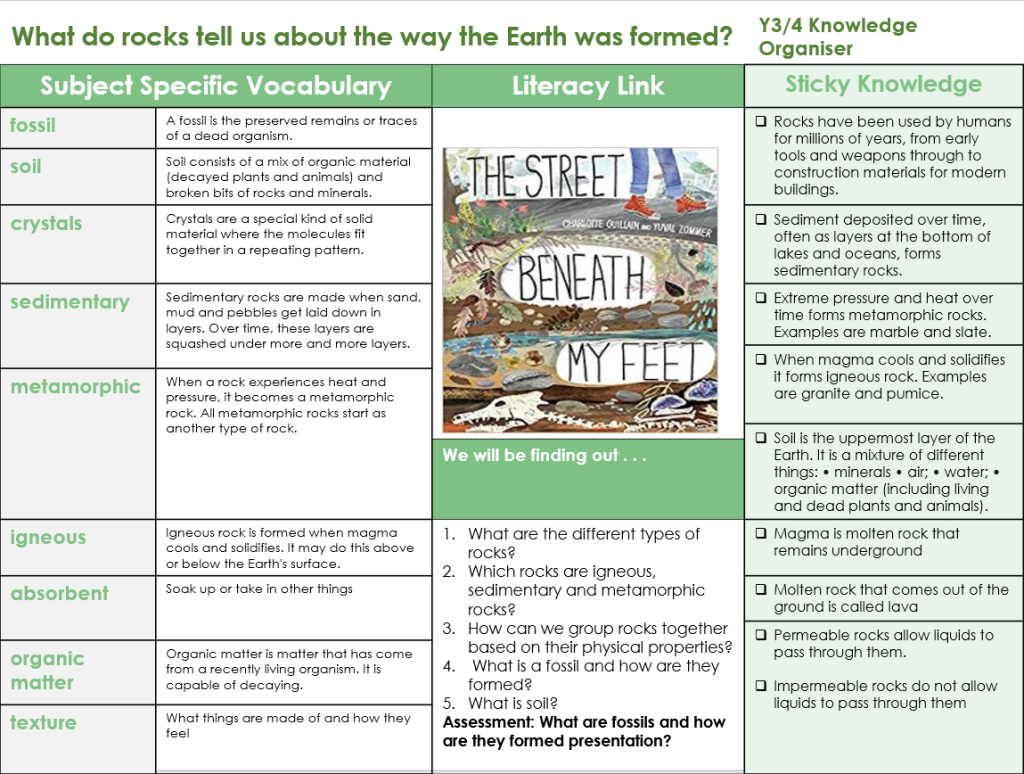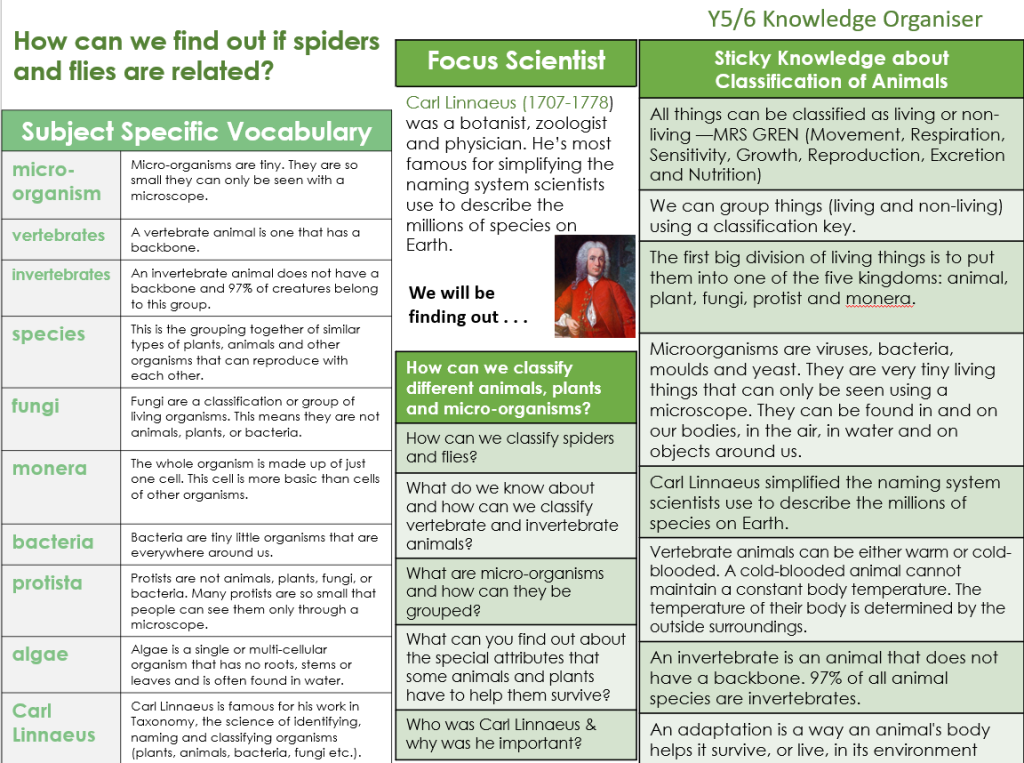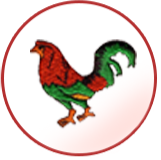
Intent
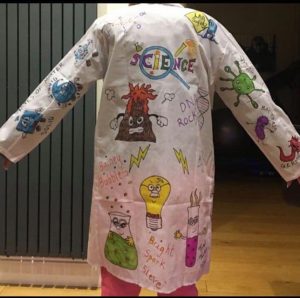 At Cockfield, we encourage children to be inquisitive throughout their time at the school and beyond. The Science curriculum fosters a healthy curiosity in children about our universe and promotes respect for the living and non-living. We believe science encompasses the acquisition of knowledge, concepts, skills and positive attitudes. Our science curriculum is enquiry based and knowledge rich. By learning a range of topics, children will have opportunities to investigate and wherever possible, to learn through varied systematic investigations, leading to them being equipped for life to ask and answer scientific questions about the world around them.
At Cockfield, we encourage children to be inquisitive throughout their time at the school and beyond. The Science curriculum fosters a healthy curiosity in children about our universe and promotes respect for the living and non-living. We believe science encompasses the acquisition of knowledge, concepts, skills and positive attitudes. Our science curriculum is enquiry based and knowledge rich. By learning a range of topics, children will have opportunities to investigate and wherever possible, to learn through varied systematic investigations, leading to them being equipped for life to ask and answer scientific questions about the world around them.
As children progress through the year groups, they build on their skills in working scientifically, as well as on their scientific knowledge, as they develop greater independence in planning and carrying out fair and comparative tests to answer a range of scientific questions. Each Science unit has an accompanying knowledge organiser which is used to help reinforce the key knowledge for each unit as set out in the science national curriculum. The knowledge organisers help children to consolidate and retain the science knowledge they have learnt and also reinforce key scientific vocabulary from each unit.
Our Science scheme of work ensures that children have a varied, progressive and well-mapped-out science curriculum that provides the opportunity for progression across the full breadth of the science national curriculum for KS1 and KS2.
The national curriculum for science aims to ensure that all pupils:
- develop scientific knowledge and conceptual understanding through the specific disciplines of biology, chemistry and physics
- develop understanding of the nature, processes and methods of science through different types of science enquiries that help them to answer scientific questions about the world around them
- are equipped with the scientific knowledge required to understand the uses and implications of science, today and for the future.
The science curriculum at Cockfield makes full use of resources within the immediate and wider local area enabling children to develop a deep understanding of the world in which they live. Children’s interests are pursued and pupil voice helps shape the curriculum.
Implementation
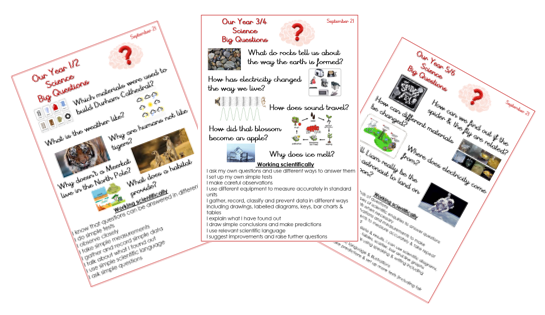
Our science curriculum is enquiry based and knowledge rich. We believe that learning is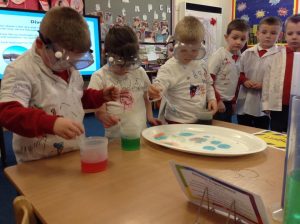 the long-term retention of knowledge and the ability to transfer it to new contexts and that children learn best by having opportunities to revisit previous learning. Therefore, our programmes of study are planned progressively, allowing children to build on their previous knowledge so that the children can fully immerse themselves and have opportunities to reflect and build on prior learning. Our long term plan allows each class to develop their prior learning from the previous year. The key knowledge and skills that children acquire and develop throughout each block have been mapped to ensure progression between year groups throughout the school.
the long-term retention of knowledge and the ability to transfer it to new contexts and that children learn best by having opportunities to revisit previous learning. Therefore, our programmes of study are planned progressively, allowing children to build on their previous knowledge so that the children can fully immerse themselves and have opportunities to reflect and build on prior learning. Our long term plan allows each class to develop their prior learning from the previous year. The key knowledge and skills that children acquire and develop throughout each block have been mapped to ensure progression between year groups throughout the school.
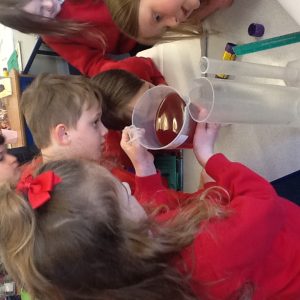 Scientific concepts, knowledge and understanding are taught through our Big Questions. There is a strong emphasis on progression of knowledge and developing pupils’ skills. Carefully selected enrichment opportunities, such as Science theme days and Science Week, enhance pupils’ learning. Curriculum organisation and timetabling enable learner’s opportunities for constant recapping of knowledge and skills with well-spaced reviews.
Scientific concepts, knowledge and understanding are taught through our Big Questions. There is a strong emphasis on progression of knowledge and developing pupils’ skills. Carefully selected enrichment opportunities, such as Science theme days and Science Week, enhance pupils’ learning. Curriculum organisation and timetabling enable learner’s opportunities for constant recapping of knowledge and skills with well-spaced reviews.
Children have opportunities to access real, hands on, practical experiences that relate to everyday life. Staff and children use and understand scientific language. Children have opportunities to investigate and test their own ideas. Lessons include meaningful and
memorable learning experiences to deepen children’s understanding.
Impact
 The impact of our Science is measured in terms of the extent to which pupils have developed new knowledge, understanding and skills and that they can use and recall this with fluency.
The impact of our Science is measured in terms of the extent to which pupils have developed new knowledge, understanding and skills and that they can use and recall this with fluency.
This will be measured by:
– Knowledge Organiser assessment tasks and regular knowledge check activities.
– In school attainment tracking of both core and foundation subjects.
– Engagement in Science enrichment activities
– Pupil voice – questionnaires, pupil book and learning reviews – Subject Leader monitoring – Lesson visits, scrutiny of books, assessment, pupil interviews and questionnaires
– Governor monitoring
The Science curriculum and resources used are evaluated annually.
Science in the Early Years
Science at Foundation Stage is covered in the ‘Understanding the World’ area of the EYFS Curriculum. It is introduced through activities that encourage every child to explore, problem solve, observe, predict, think, make decisions and talk about the world around them.
During their first years at school our children will explore creatures, people, plants and objects in their natural environments. They will observe and manipulate objects and materials to identify differences and similarities. They will also learn to use their senses, feeling dough or listening to sounds in the environment. They will make observations of animals and plants and explain why some things occur and talk about changes. Children are encouraged to ask questions about why things happen and how things work. They might do activities such as increasing the incline of a slope to observe how fast a vehicle travels, or opening a mechanical toy to see how it works. Children will also be asked questions about what they think will happen to help them communicate, plan, investigate, record and evaluate findings.
Working Scientifically
Children have opportunities to access real, hands on, practical experiences that relate to everyday life. Staff and children use and understand scientific language. Children have opportunities to investigate and test their own ideas. Lessons include meaningful and
memorable learning experiences to deepen children’s understanding.
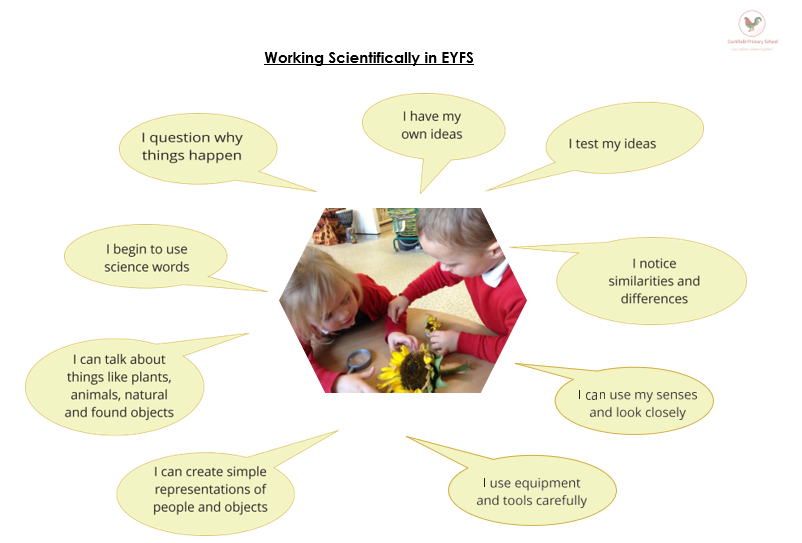
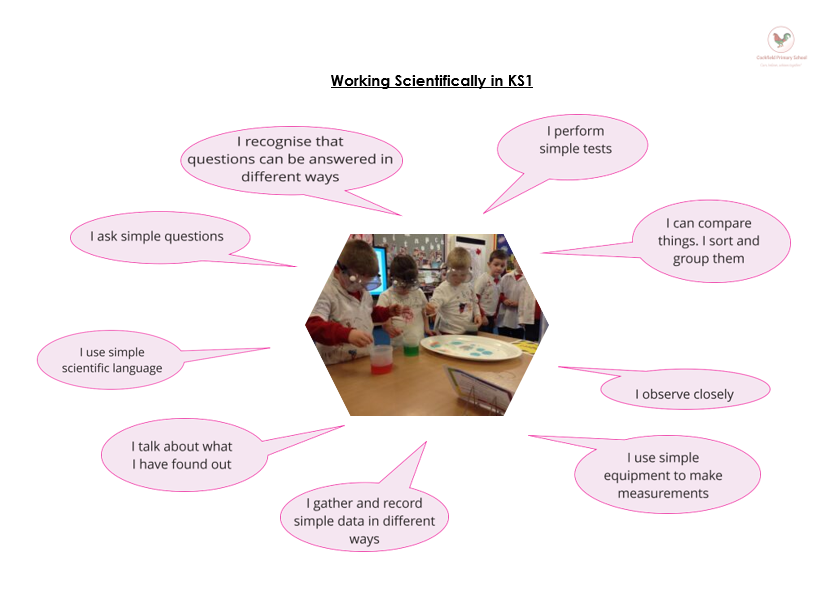
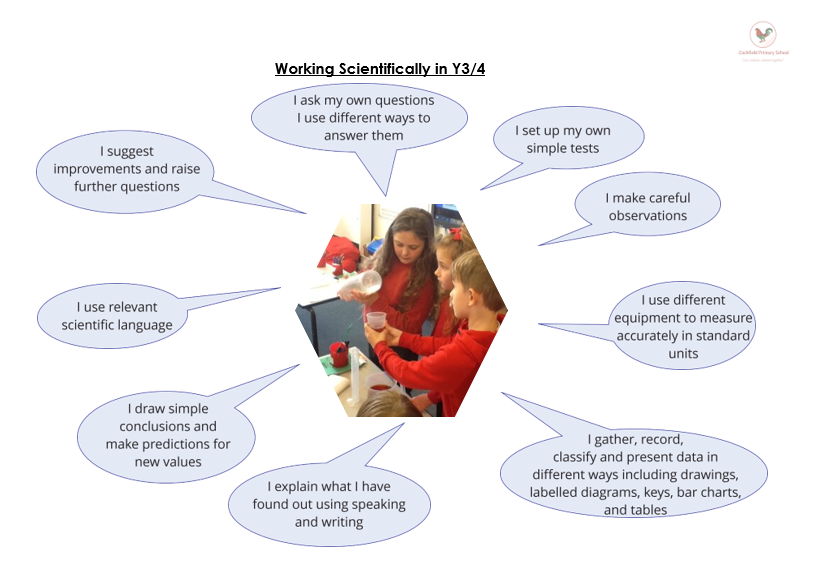
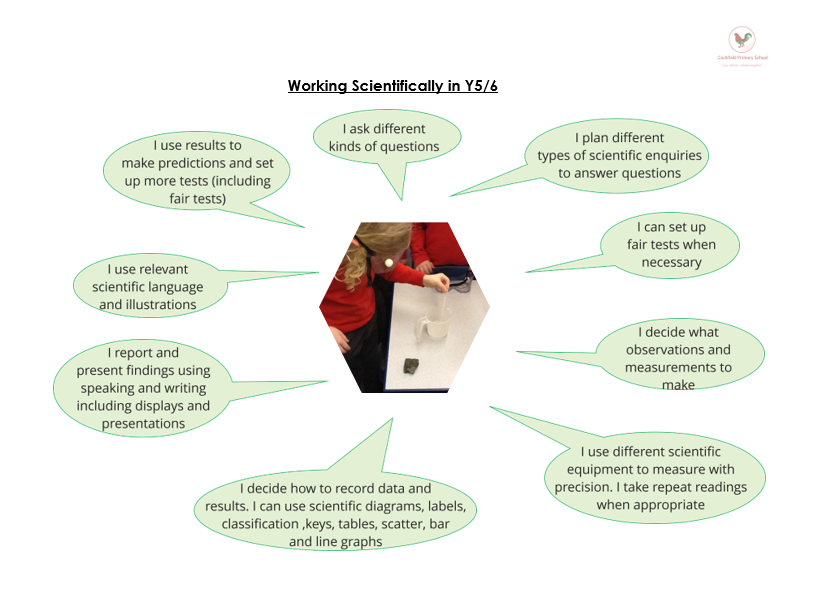
Science Big Question Overview
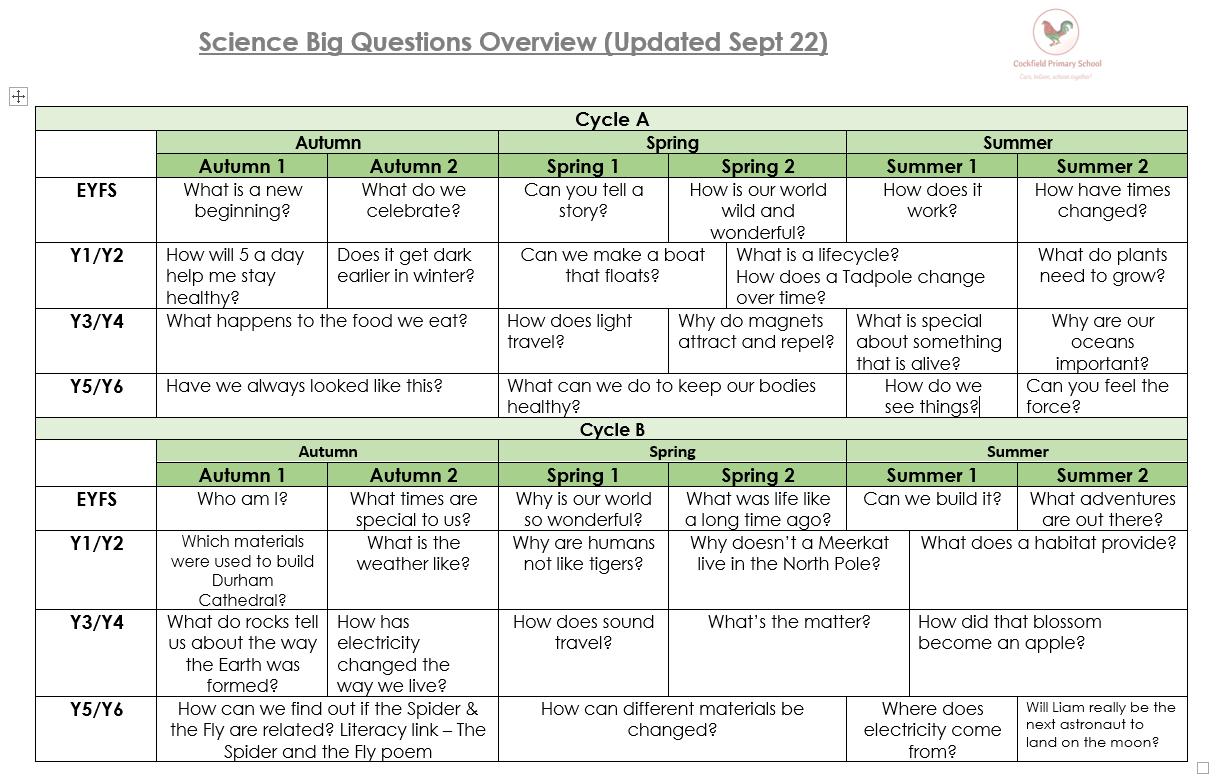
Science Knowledge Organisers
